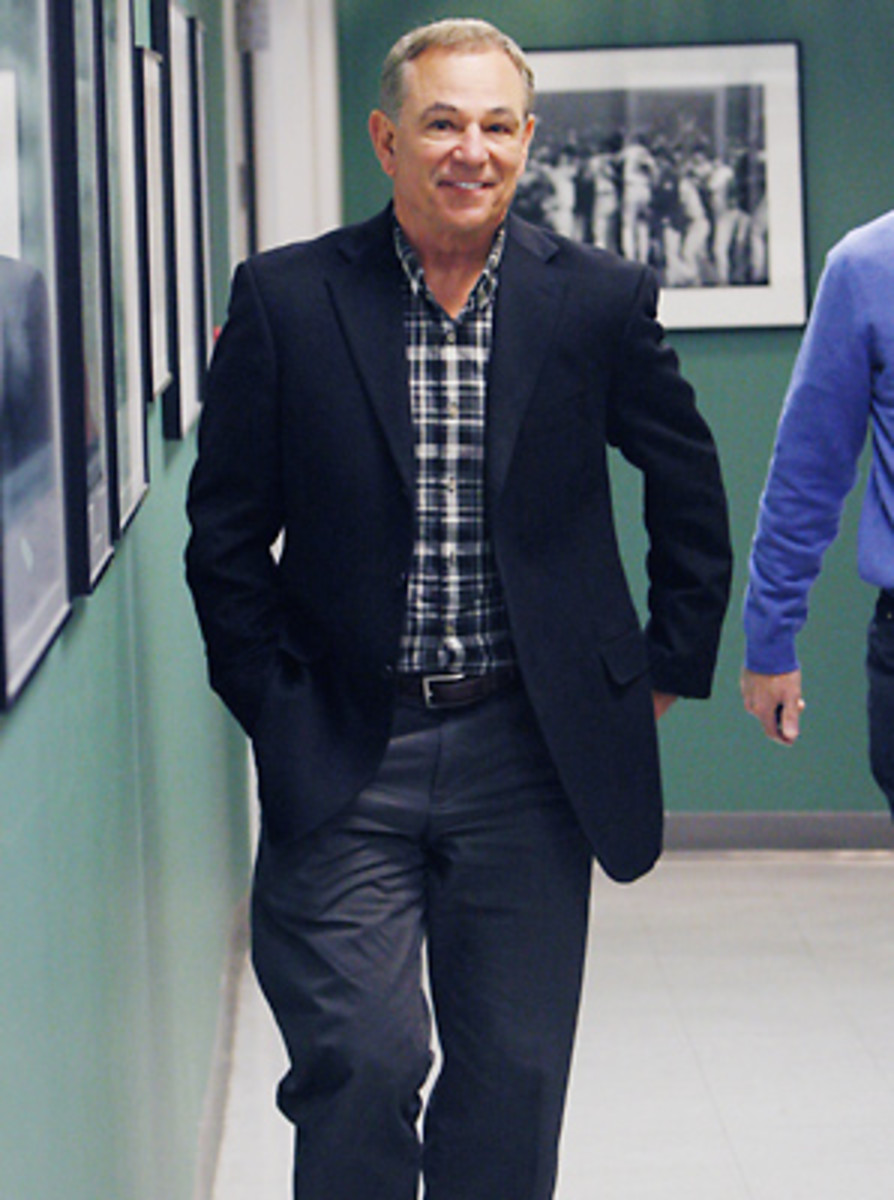
Red Sox take risk with Valentine
The job of managing the Red Sox can be a cauldron of unforgiving heat and scrutiny. This will be the case even more so in 2012 after an historic September collapse further marred by the post hoc revelations that the club's best pitchers were dining on fried chicken and beer during games in the clubhouse.
The latest man to agree to sit on that bench is Bobby Valentine, who reportedly accepted the position Tuesday night with a formal announcement expected later in the week. The runner-up was Tigers third-base coach Gene Lamont, a former manager of the White Sox and Pirates, who was seen as the safer choice.
Hiring Valentine is nothing short of a gamble. After all, Valentine hasn't managed in the U.S. since 2002 and most recently worked as a television analyst. He has never won a division in his 12 full seasons with the Rangers and Mets (though he won two wild cards and one NL pennant in New York). His greatest success came in Japan, where he managed the Chiba Marines for six seasons, leading them to their first Japan Series title in 31 years and, soon thereafter, to a victory in the inaugural Asia Series.
There is no dispute that the 61-year-old Valentine has a sharp baseball mind, whose inability to reach the playoffs in Texas were generally the result of an inadequate roster and whose success in New York were, in part, a testament to his ability to extract performance out of what many considered an overachieving club.
But, of course, there are two far more incendiary considerations: Valentine's strong personality could backfire as easily as it could succeed; and the very decision to hire Valentine may not have been made by the man who customarily makes such decisions, the general manager.
The latter point first: Ben Cherington has held the title of general manager for five weeks after, in succession, the franchise of great expectations endured a harrowing final month in which it choked away a playoff spot; witnessed a series of leaks that smeared the names of its starting rotation and its two-time World Series-champion manager, Terry Francona; and then lost its hometown-hero genius of a G.M., who just so happened to be a dear friend of Cherington's.
So just as Cherington is looking to crawl out from under that enormous amount of baggage and assert his dominion as the new baseball leader of the Red Sox, the club hires Valentine, a friend of meddlesome team president Larry Lucchino and a name that did not initially appear on Cherington's public list of managerial candidates.
In other words, Cherington appears to have been circumvented on his first meaningful decision and now has his reputation staked to a man that he may not have wanted.
How tight is the rope being walked? The Red Sox' major-league roster, which has only a couple holes that surely will be addressed this offseason, remains loaded with first-rate veteran talent that should catapult them right back to contention, though with very little margin for error given the club's collective ages and contract statuses. As currently constructed, Boston's roster is constructed to win now with a window of no more than two or three years.
Valentine's in-game strategy, shaped by an understanding of the sabermetric principles that are popular in the Red Sox front office, should endear him to those he works for. Among the examples of his managerial philosophy: a preference for a leadoff hitter with a high on-base-percentage (even if it's an otherwise unorthodox choice like the Mets' Benny Agbayani), a refusal to bunt unless for a hit, stringent preparation through video study before it was common practice and a penchant for liberal use of his bullpen to create favorable matchups.
And this isn't just a matter of handing a manager a talented team and asking him to win -- it's a matter of rejuvenating a lackluster clubhouse of stars who weren't the type to all join hands and sing "Kumbaya" together.
Even in a normal situation, a successful Red Sox skipper needs to have an outsized and/or likeable personality to manage not only the players but the media and fans, given the unceasing demands of one of baseball's most fervent markets.
This could be a perfect match for the spotlight-loving Valentine, but it also could be a problem. His big-market experience in New York is certainly a plus, as is his work in the baseball-mad country of Japan, where a statue of Valentine was built and a street renamed in his honor. Valentine is engaging and charismatic but steadfast in his convictions and occasionally quarreled with players and media in New York, not to mention a turbulent relationship with his G.M., Steve Phillips.
In making this move the Red Sox hoped to recreate "Bobby Magic" -- the catch-all phrase used to describe Valentine's wild success as a manager in Japan earlier this decade -- and are doing so the opposite way of how old management stumbled upon the success of "Morgan Magic," which marked Boston's unexpected second-half surge to a division title in 1988 under unassuming interim manager Joe Morgan, who was slated to be a placeholder as the club sought a more high-profile replacement.
The point being, the Sox aren't known for hiring the celebrity manager. Francona, after all, arrived with virtually no hype, having managed only four previous losing seasons with the Phillies before taking over in Boston. And he became the most successful Red Sox manager in a century.
Valentine represents a radical departure from the managerial blueprint the Red Sox have used for decades but, then again, the Red Sox are hoping for a radical departure from last season too.





